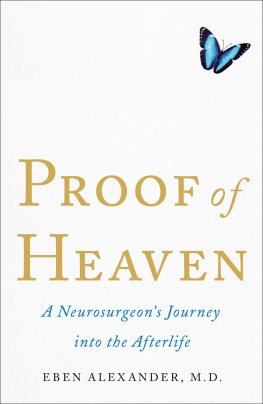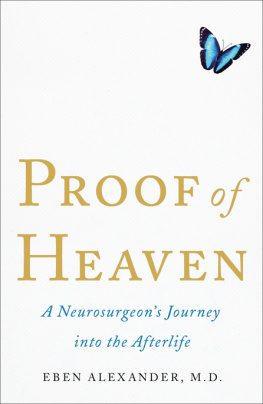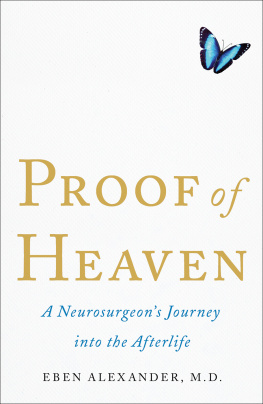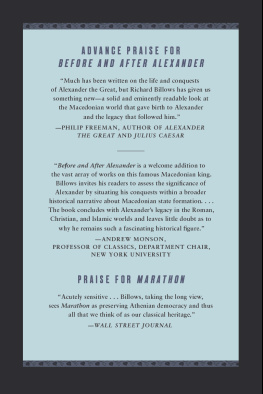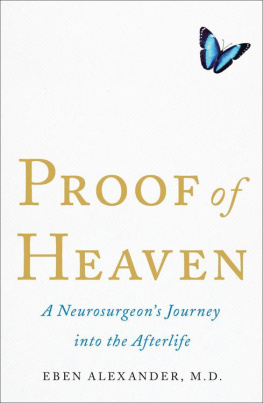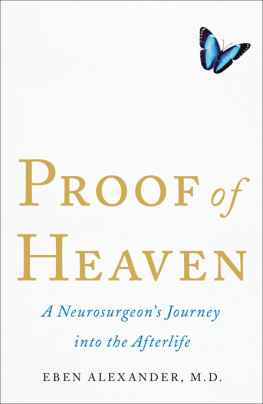Eben Alexander, M.D.
PROOF OF HEAVEN
A Neurosurgeons Journey into the Afterlife
This book is dedicated to all of my loving family, with boundless gratitude.
A man should look for what is, and not for what he thinks should be.
ALBERT EINSTEIN (18791955)
When I was a kid, I would often dream of flying.
Most of the time Id be standing out in my yard at night, looking up at the stars, when out of the blue Id start floating upward. The first few inches happened automatically. But soon Id notice that the higher I got, the more my progress depended on meon what I did. If I got too excited, too swept away by the experience, I would plummet back to the ground hard. But if I played it cool, took it all in stride, then off I would go, faster and faster, up into the starry sky.
Maybe those dreams were part of the reason why, as I got older, I fell in love with airplanes and rocketswith anything that might get me back up there in the world above this one. When our family flew, my face was pressed flat to the planes window from takeoff to landing. In the summer of 1968, when I was fourteen, I spent all the money Id earned mowing lawns on a set of sailplane lessons with a guy named Gus Street at Strawberry Hill, a little grass strip airport just west of Winston-Salem, North Carolina, the town where I grew up. I still remember the feeling of my heart pounding as I pulled the big cherry-red knob that unhooked the rope connecting me to the towplane and banked my sailplane toward the field. It was the first time I had ever felt truly alone and free. Most of my friends got that feeling in cars, but for my money being a thousand feet up in a sailplane beat that thrill a hundred times over.
In college in the 1970s I joined the University of North Carolina sport parachuting (or skydiving) team. It felt like a secret brotherhooda group of people who knew about something special and magical. My first jump was terrifying, and the second even more so. But by my twelfth jump, when I stepped out the door and had to fall for more than a thousand feet before opening my parachute (my first ten second delay), I knew I was home. I made 365 parachute jumps in college and logged more than three and a half hours in free fall, mainly in formations with up to twenty-five fellow jumpers. Although I stopped jumping in 1976, I continued to enjoy vivid dreams about skydiving, which were always pleasant.
The best jumps were often late in the afternoon, when the sun was starting to sink beneath the horizon. Its hard to describe the feeling I would get on those jumps: a feeling of getting close to something that I could never quite name but that I knew I had to have more of. It wasnt solitude exactly, because the way we dived actually wasnt all that solitary. Wed jump five, six, sometimes ten or twelve people at a time, building free-fall formations. The bigger and the more challenging, the better.
One beautiful autumn Saturday in 1975, the rest of the UNC jumpers and I teamed up with some of our friends at a paracenter in eastern North Carolina for some formations. On our penultimate jump of the day, out of a D18 Beechcraft at 10,500 feet, we made a ten-man snowflake. We managed to get ourselves into complete formation before we passed 7,000 feet, and thus were able to enjoy a full eighteen seconds of flying the formation down a clear chasm between two towering cumulus clouds before breaking apart at 3,500 feet and tracking away from each other to open our chutes.
By the time we hit the ground, the sun was down. But by hustling into another plane and taking off again quickly, we managed to get back up into the last of the suns rays and do a second sunset jump. For this one, two junior members were getting their first shot at flying into formationthat is, joining it from the outside rather than being the base or pin man (which is easier because your job is essentially to fall straight down while everyone else maneuvers toward you). It was exciting for the two junior members, but also for those of us who were more seasoned, because we were building the team, adding to the experience of jumpers whod later be capable of joining us for even bigger formations.
I was to be the last man out in a six-man star attempt above the runways of the small airport just outside Roanoke Rapids, North Carolina. The guy directly in front of me was named Chuck. Chuck was fairly experienced at relative work, or RWthat is, building free-fall formations. We were still in sunshine at 7,500 feet, but a mile and a half below us the streetlights were blinking on. Twilight jumps were always sublime and this was clearly going to be a beautiful one.
Even though Id be exiting the plane a mere second or so behind Chuck, Id have to move fast to catch up with everyone. Id rocket straight down headfirst for the first seven seconds or so. This would make me drop almost 100 miles per hour faster than my friends so that I could be right there with them after they had built the initial formation.
Normal procedure for RW jumps was for all jumpers to break apart at 3,500 feet and track away from the formation for maximum separation. Each would then wave off with his arms (signaling imminent deployment of his parachute), turn to look above to make sure no others were above him, then pull the rip cord.
Three, two, one go!
The first four jumpers exited, then Chuck and I followed close behind. Upside down in a full-head dive and approaching terminal velocity, I smiled as I saw the sun setting for the second time that day. After streaking down to the others, my plan was to slam on the air brakes by throwing out my arms (we had fabric wings from wrists to hips that gave tremendous resistance when fully inflated at high speed) and aiming my jumpsuits bell-bottomed sleeves and pant legs straight into the oncoming air.
But I never had the chance.
Plummeting toward the formation, I saw that one of the new guys had come in too fast. Maybe falling rapidly between nearby clouds had him a little spookedit reminded him that he was moving about two hundred feet per second toward that giant planet below, partially shrouded in the gathering darkness. Rather than slowly joining the edge of the formation, hed barreled in and knocked everybody loose. Now all five other jumpers were tumbling out of control.
They were also much too close together. A skydiver leaves a super-turbulent stream of low-pressure air behind him. If a jumper gets into that trail, he instantly speeds up and can crash into the person below him. That, in turn, can make both jumpers accelerate and slam into anyone who might be below them. In short, its a recipe for disaster.
I angled my body and tracked away from the group to avoid the tumbling mess. I maneuvered until I was falling right over the spot, a magical point on the ground above which we were to open our parachutes for the leisurely two-minute descent.
I looked over and was relieved to see that the disoriented jumpers were now also tracking away from each other, dispersing the deadly clump.
Chuck was there among them. To my surprise, he was coming straight in my direction. He stopped directly beneath me. With all of the groups tumbling, we were passing through 2,000 feet elevation more quickly than Chuck had anticipated. Maybe he thought he was lucky and didnt have to follow the rulesexactly.
He must not see me. The thought barely had time to go through my head before Chucks colorful pilot chute blossomed out of his backpack. His pilot chute caught the 120-mph breeze coming around him and shot straight toward me, pulling his main parachute in its sleeve right behind it.
From the instant I saw Chucks pilot chute emerge, I had a fraction of a second to react. For it would take less than a second to tumble through his deploying main parachute, andquite likelyright into Chuck himself. At that speed, if I hit his arm or his leg I would take it right off, dealing myself a fatal blow in the process. If I hit him directly, both our bodies would essentially explode.

